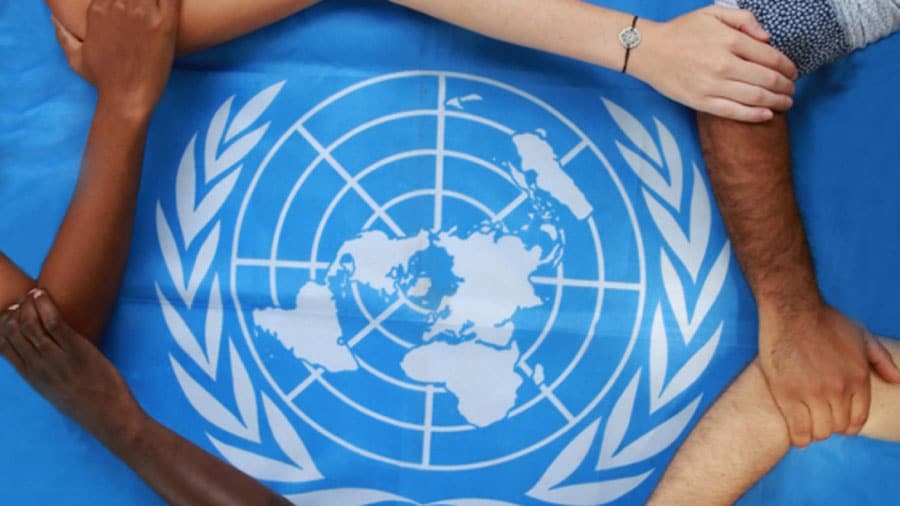On the 75th anniversary of the United Nations, Member States pledged to strengthen global governance for the sake of present and coming generations.
The UN 75 declaration noted the need to promote peace and prevent conflicts.
“Ongoing armed conflicts and threats against international peace and security must be urgently resolved through peaceful means. We reiterate the importance of abiding by the Charter, principles of international law, and relevant resolutions of the Security Council. International arms control, non-proliferation and disarmament agreements and their architectures need to be upheld. The United Nations must better address all forms and domains of threats. Terrorism and violent extremism conducive to terrorism are serious threats to international peace and security. The diplomatic toolbox of the Charter needs to be used to its full potential, including preventive diplomacy and mediation. We call on the Secretary-General to enhance this toolbox to prevent the outbreak, escalation and recurrence of hostilities on land, at sea, in space and in cyberspace. We fully support and promote the Secretary-General’s initiative for a global ceasefire. International humanitarian law must be fully respected. To build, keep and sustain peace is now one of the main responsibilities of the United Nations.”
Member States requested the Secretary-General to report back with recommendations to advance our common agenda and to respond to current and future challenges (UN75 declaration – A/RES/75/1). His report ‘Our Common Agenda‘ was launched on 10 September 2021.
A New Agenda for Peace
The Secretary-General’s report on Our Common Agenda noted the need for a New Agenda for Peace[1] to address a myriad of challenges the international community faces today. The report noted that in order to protect and manage the global public good of peace, we need a peace continuum based on a better understanding of the underlying drivers and systems of influence that are sustaining conflict, a renewed effort to agree on more effective collective security responses and a meaningful set of steps to manage emerging risks.
In this respect, Our Common agenda outlined six potential areas for the New Agenda for peace, including, but not limited to, the following:
- Reducing strategic risks
- Strengthening international foresight and capacities to identify and adapt to new risks
- Reshaping responses to all forms of violence
- Investing in prevention and peacebuilding
- Supporting regional prevention
- Putting women and girls at the centre.
Consultations
Resolution A/RES/76/6 adopted by the General Assembly on 15 November 2021 followed up on “Our Common Agenda” and requested the Secretary-General to inform Member States and to engage in broad and inclusive consultations with them, all parts of the United Nations system and other relevant partners on his proposals in the report for follow-up action to accelerate the full and timely implementation of the above-mentioned agreed frameworks in a comprehensive and integrated manner, and to provide regular updates to Member States.
In the informal thematic consultations organized by the President of the General Assembly on “Our Common Agenda” in February and March 2022, the United Nations system was invited to develop a ‘New Agenda for Peace’ in close consultation with Member States, and in collaboration with all relevant partners, as part of the preparations for the Summit of the Future.
Member States
Austria | Belgium | Brazil | China – CN EN | Croatia | Colombia | Finland | France – EN FR | Georgia | Greece | India | Iran
Ireland | Japan | Kenya | Morocco | Netherlands | Norway | Pakistan | Portugal | Qatar | Republic of Korea
Russian Federation – EN RU | Senegal | Switzerland | Syria | Thailand | Ukraine | United Kingdom
Groups of Member States
G7 | Group of Friends in Defense of the Charter of the United Nations | Group of Friends of Responsibility to Protect
Regional and other Organizations
Collective Security Treaty Organization | Conference on Interaction and Confidence-building Measures in Asia | European Union | INTERPOL | League of Arab States
North Atlantic Treaty Organization | Organization for Security and Co-operation in Europe | Organization of American States
Organization of the Black Sea Economic Cooperation
Open call to Civil Society
The Secretariat invites Civil Society Organisations to share their views, priorities and potential recommendations for a “New Agenda for Peace.” The written submission can be sent to Interdepartmental Team of the New Agenda for Peace at NewAgendaforPeace@un.org.
UN system
International Labour Organization (ILO) | International Organization for Migration (IOM) | UN Alliance of Civilizations | UN Department of Economic and Social Affairs (DESA)
UN High Commissioner for Refugees (UNHCR) | UN Office on Drugs and Crime (UNODC) | UN Trust Fund for Human Security (UNTFHS) | UN Women
[1] For the full description of the six core areas please see Our Common Agenda (paragraphs 88-89)


